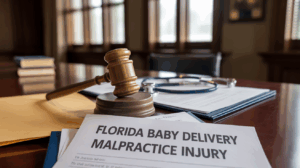
If your child suffered an injury before, during, or shortly after birth, you may wonder what financial help the law provides. Florida allows families to seek compensation when medical mistakes cause lasting harm. The damages available can cover medical costs, lost income, and the emotional impact of what happened.
Because every case is different, the amount and type of compensation depend on your child’s medical needs and how the injury affects your family’s life. In the sections below, we explain the main categories of damages, how claims work in Florida, and the steps our Florida birth injury lawyers take to protect your rights and pursue full recovery.
Understanding Birth Injury Malpractice in Florida
A birth injury happens when medical errors cause harm before, during, or shortly after delivery. Some injuries are temporary, while others may require lifelong care. Common examples include:
- Cerebral palsy
- Brachial plexus injuries (Erb’s palsy)
- Fractured collarbone or bones
- Oxygen deprivation (hypoxic-ischemic encephalopathy)
- Brain bleeding or swelling
- Facial nerve damage
- Shoulder dystocia injuries
- Skull fractures
Medical malpractice occurs when a doctor, nurse, or hospital fails to meet accepted medical standards. That failure might involve:
- Mismanaging a pregnancy complication
- Delaying a C-section
- Using delivery tools improperly
- Ignoring fetal distress signs
Any provider involved in prenatal care or childbirth, such as OB-GYNs, nurses, anesthesiologists, or the hospital itself, could be responsible.
Types of Compensation Available in a Florida Birth Injury Case
Florida law allows families to recover several forms of damages after a birth injury. These categories help address both the financial impact and the personal toll caused by medical negligence:
Economic Damages: Your Family’s Financial Losses
Economic damages reimburse the measurable financial losses tied to your child’s injury. They often include:
- Immediate medical expenses: Hospital stays, neonatal intensive care (NICU), diagnostic testing, emergency procedures, and medications needed right after birth
- Follow-up and specialized care: Pediatric specialists, neurology, orthopedics, or developmental monitoring during infancy and childhood
- Therapies and rehabilitation: Ongoing physical, occupational, and speech therapy to support mobility, communication, and daily living skills
- Assistive devices and adaptive equipment: Wheelchairs, braces, feeding equipment, communication aids, or home modifications such as ramps and lifts
- Future medical procedures: Surgeries, injections, or long-term medication management as the child grows
- Long-term nursing or in-home care: Help with daily activities if the child has mobility or self-care limitations
- Special education costs: Individualized learning support, tutoring, or specialized schooling to meet developmental needs
- Lost parental income: Wages lost when a parent must leave work or reduce hours to provide care
- Loss of future earning capacity: If the child’s injury will limit their ability to work or earn income as an adult
- Transportation costs: Accessible vehicles, travel to specialists, or increased fuel and parking expenses for frequent appointments
These expenses can add up fast. We focus on identifying every financial impact so that you aren’t left paying for someone else’s mistake.
Non-Economic Damages: Your Family’s Personal Losses
Non-economic damages address the personal, harder-to-measure losses you and your child experience. These can include:
- Physical pain and discomfort: The child may face ongoing pain from muscle stiffness, surgeries, or mobility challenges
- Emotional distress: Anxiety, depression, or grief for parents coping with an unexpected diagnosis and long-term caregiving demands
- Loss of enjoyment of life: The child may miss out on everyday activities or independence; parents may lose the typical parenting experience they expected
- Mental anguish: Worry about the child’s future, feelings of guilt, or constant stress about medical decisions
- Impact on family relationships: Strain between partners or siblings due to caregiving responsibilities and emotional stress
- Loss of companionship and social connection: Fewer opportunities for the child to form friendships and participate in activities, and isolation for parents balancing complex care needs.
It should be noted that Florida no longer limits the amount families can recover for non-economic damages, such as pain and suffering, in medical malpractice or birth injury cases. The state’s Supreme Court struck down previous caps, meaning parents can seek full compensation for the emotional and life-changing impact of a preventable birth injury.
Wrongful Death Damages
In the most tragic situations, a birth injury can lead to the loss of a newborn’s life. Florida’s wrongful death law allows parents to pursue compensation for the emotional and financial impact of that loss. These damages are meant to help families find some stability after an unimaginable tragedy.
Common wrongful death damages may include:
- Funeral and burial expenses
- Prior medical expenses
- Emotional pain and suffering of the parents
A wrongful death lawyer can explain the legal process and manage your case so that you and your family can grieve your loss.
Punitive Damages
Punitive damages are rare but possible in cases of extreme negligence or intentional harm. Awarded by a judge or jury, they serve to punish reckless providers and discourage similar conduct in the future. If the facts of your case show serious disregard for safety, we can explore this option.
How We Determine the Value of Your Claim
When our personal injury lawyers take on your birth injury case, we will investigate the events leading up to and through the birth of your child. Our legal team will collect and analyze the evidence we discover, along with procuring the testimony of a medical expert witness. We will identify who was at fault and how, plus we will compile a complete list of your damages.
When we seek compensation, your settlement should reflect those damages, but it is influenced by such factors as:
- Severity of the injury: How serious and permanent the harm is
- Future care needs: The amount of medical treatment and support the child will require over a lifetime
- Strength of the evidence: Clear proof that the provider was negligent and caused the injury
- Insurance or hospital resources: How much coverage or funds are available to pay the claim
- Shared fault: Whether anyone argues that other factors caused or worsened the injury
- Trial risk: How likely it is the case would succeed in court if it doesn’t settle
Our role is to fight for the highest possible compensation under Florida law. We carefully review every category of damages, from immediate hospital bills to lifelong care costs, and build a strong case for full recovery.
We negotiate with insurers and prepare to go to trial if needed. Our focus is on making sure you have the financial support necessary to care for your child and move forward with confidence.
Florida’s Statute of Limitations for Birth Injury Claims
In Florida, it’s critical to understand the deadlines for taking legal action. You normally have two years from the date you discovered, or reasonably should have discovered, that medical negligence caused the birth injury. Since the injury involves a child and medical malpractice, additional exceptions and rules will apply.
Your Florida birth injury lawyer can examine your case and explain the deadlines that apply, but you must contact us as soon as possible. With early notice, we can protect your family’s rights and preserve evidence before it is lost or destroyed.
Learn More About the Compensation Available for Your Child’s Care and Future
Contact Anidjar & Levine today for a free consultation. We’ll help you get the money you deserve so you can focus on caring for your family. You pay nothing unless we recover compensation for you.










